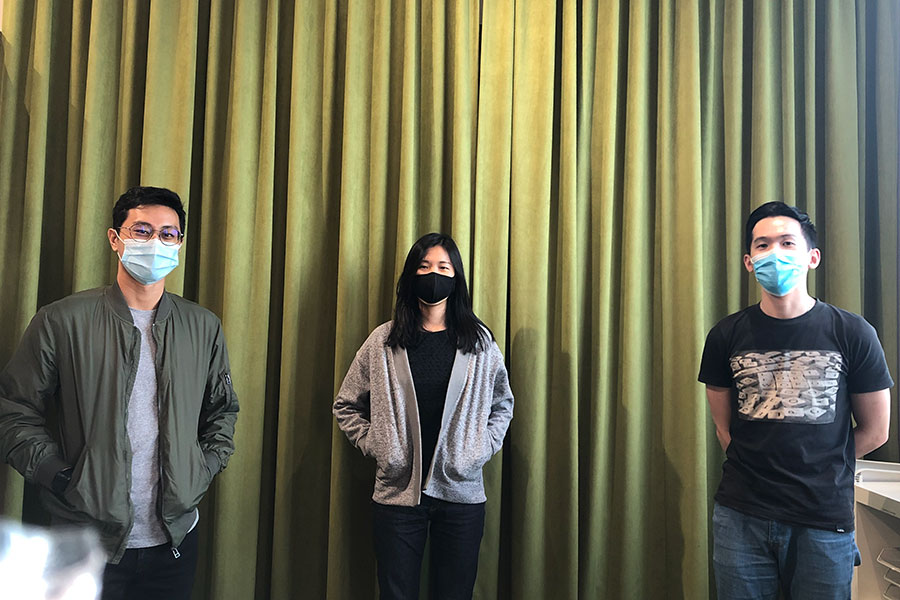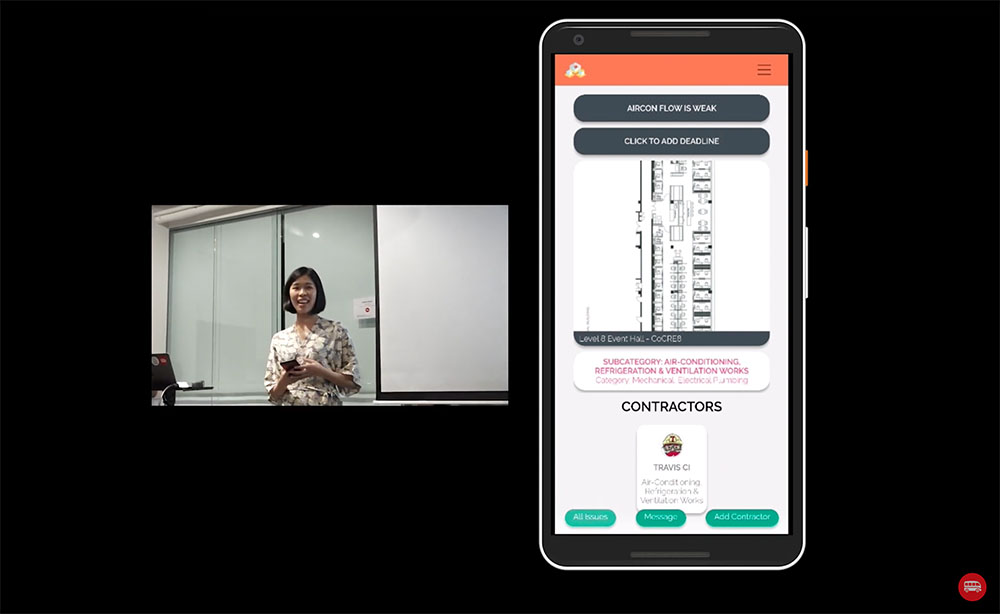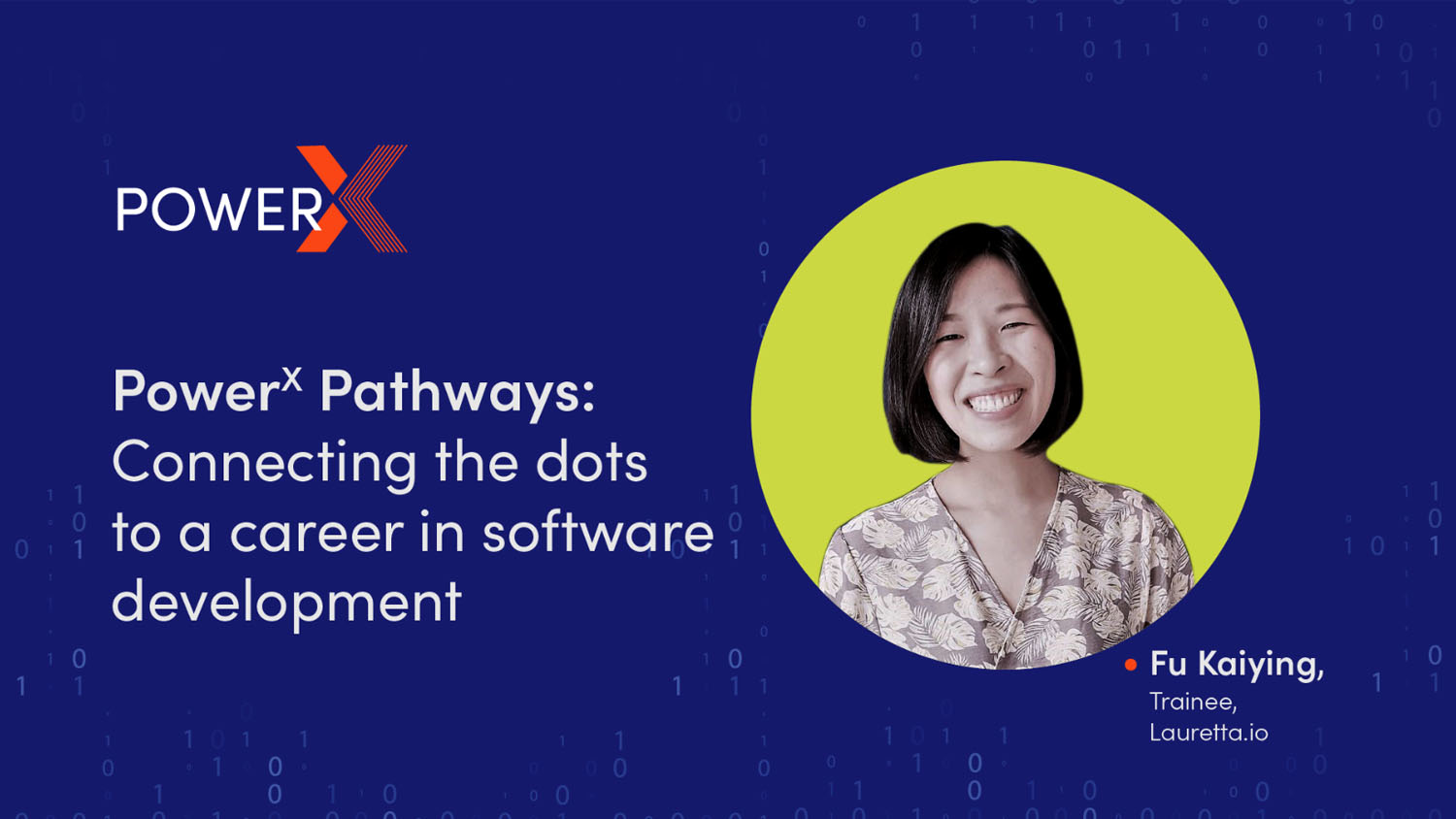PowerX Pathways: Connecting the dots to a career in software development
Mon, 01/17/2022 - 12:00
A conversation with Fu Kaiying, a trainee on SGInnovate’s PowerX Software & Product Development programme. The traineeship is a 12-month, full-time programme split into two phases – modular training with a capstone project, and full-time on-the-job-training with a partner company.
Share with us about your professional background and what you do at Lauretta.io.
My first two roles were in digital marketing and product planning, respectively, at an infosecurity company in Seoul, Korea, that specialised in cybersecurity, in areas such as enterprise web application firewalls and connected car security.
Three years later, I moved back to Singapore to kickstart my journey as a software developer by enrolling in a full-stack bootcamp. While I was looking for front-end/full-stack positions, I landed back to a product role instead, as a product manager at a local tech startup called Evie.ai. The bootcamp better equipped me to communicate with and support the engineers on my team, as well as gained a deeper insight into the work they do.

Kaiying (centre) with her fellow PowerX trainees at Lauretta.io
I’m now a trainee with the PowerX Software & Product Development programme, and am working with Lauretta as part of my on-the-job-training. A typical day at work starts with a call with the team to share updates on our ongoing and upcoming projects, and to flag up issues I will potentially have. Earlier on, I mostly did pair programming with a fellow PowerX trainee.
The two projects we have been working on have AI components and involve learning new concepts like 3D rendering or transferring and processing video feed efficiently across multiple machines in real time. This means spending a significant amount of time researching these new concepts and exploring solutions. As such, we would often test out different approaches independently or tackle different parts of the problem in parallel — see what works, and then come together to stitch our code.
What prompted you to pick up programming / coding, and how did you get started?
My first brush with programming (aside from your ‘90s HTML class blog) was an ‘Intro to Computer Science in Java Programming’ class I took on an exchange programme in 2014. It did not end up fulfilling the ‘Science’ requirement for my degree, but we were able to code a simple game of MasterMind to play on the command line by the end of the course. It was fascinating that the simple building blocks of if/else statements and loops could create an interactive game with rules, feedback and scoring. I loved how intellectually rigorous it was to create these blocks of logic and have been intrigued since. I even considered a second bachelor degree at the end of college!
When I became communications manager at Penta Security Systems Inc., my job scope included creating content about web application security. This got me even more curious about web development because I had to understand what we were trying to protect, but was barely scratching the surface of understanding how applications work and what makes them vulnerable.
While I later moved into a slightly more technical role in product planning, I longed to be in the role of how software is developed.
So in 2019, I completed the full-stack software development bootcamp with LeWagon, followed by a mentorship programme with TechLadies in 2020. By 2021, I was pretty sure about how much I enjoyed and missed coding.I left my job to focus on skilling up full-time and made a career switch.

Showing off her skills in software development
It was two years after bootcamp then and my skills were rusty , so I followed an open-source curriculum at The Odin Project to refresh my knowledge. It was humbling to realise so much gets lost when you do not put your skills to action often enough. I’m glad for the structured training we get through PowerX because the assignments give you immediate practice . The on-the-job-training segment is, of course, the best part, as a trial by fire, because you are completely outside your comfort zone and dealing with real-world constraints and complexities.
What were the biggest challenges you faced in making a career transition to a technical role? How has the PowerX programme been helpful in navigating these changes?
My confidence from learning in the classroom and working on personal projects did not translate well into the professional context, especially in the beginning. The stakes are higher when you’re producing work for a real customer, and I instinctively avoided big changes, choosing solutions within boundaries of what’s familiar It‘s the opposite of how I operated when coding outside of work, where I seek out the unfamiliar as a learning opportunity.
But the trainee I pair-programmed with has been consistently unfazed by the unfamiliar and delivers. For him, if a different approach changes the code base and works, why not?
It was a good reminder that despite being a novice, it does not mean you do not have the licence to erase or shift things around, especially when the code changes are reversible.
The breadth of exposure through PowerX’s structured training also helped set a good base for all of us who came into the programme with various levels and areas of experience. In addition, because of the financial support through the programme, companies undertake lesser risk when extending opportunities to beginners like me, especially in the initial training and ramping-up phase. The technical assessments administered also provided some early indicators of potential that I would not have been able to showcase if my resume was just filtered out for not having the ‘right’ degree.
Your past career experiences span product management to marketing communications, and now software and product development. What motivates you to keep learning and picking up different skills?
It’s easy to lose motivation when you compare yourself with others, so I keep reminding myself not to. A friend’s wise mom once said, “It doesn’t matter if someone else takes two minutes and you take 25 years to learn what you wanted to learn as long as you get there”.
Moving to Korea, learning a new language, and taking on the label of ‘foreigner’ have all been situations where I needed to get used to looking outwards for a reference point. That experience has helped me to be more open to what others can teach me.
Of course, no one aspires to remain a novice forever, so the goal is not to keep switching lanes, but to always be in the vicinity of my interests. The way I worked with the design team when I was in marketing and how I worked with engineering as a product manager were similar and the teams appreciate it when I focus on the ‘Why’ and ‘What’, and not the ‘How’ when communicating requirements. However, I have always also been interested in the ‘How’ and building things, so this career transition is right for me.
The moves from marketing to product and now to development were driven by my curiosity to understand information technology. I only had a vague grasp on these concepts in the beginning and working with a product on a level as (somewhat) concrete as code now brings me a lot of satisfaction.
What advice do you have for young professionals looking to broaden their career experiences?
Especially in the early-career stage, it really pays to broaden your experience. At 23, I dismissed the idea of a second degree (Computer Science) because I felt finishing at 27 would be too old! Now, I’m 28 and basically starting afresh in a new field. It does not feel late at all because I found something I really enjoy.
I think it takes hindsight to see the dots connect, and what felt like detours in the beginning all add up to the opportunity I now have. My role in digital marketing involved understanding SQL for creating data analytics dashboards, as well as basic HTML for creating newsletters and landing pages. Moving to a product role in the same company helped open more opportunities later in the tech scene because it was a relatively rare skill set. My former role as product manager for an AI startup allowed me to work closely with engineers who inspired me with how they think and make decisions.
Late-career switchers have their challenges, but I have a colleague in his fifties who recently picked up programming and he’s pretty darn brilliant and frequently provides guidance to the rest of us trainees.
My advice is to take steps to gauge a fit so that you can make an informed decision. It takes time and experience for the less glamorous parts of that new interest to surface. That said, most of what you’ll need to learn you’ll end up learning on-the-job anyway, so if handed the opportunity, don’t worry about whether you’re good enough and just do it.
Find out more about talent programmes such as SGInnovate’s PowerX here.
Trending Posts
- A Guide to Singapore’s Hydrogen Ecosystem
- Walking the tightrope of disclosure to create a robust IP strategy
- Why intellectual property (IP) strategy can mean the difference between life and death for a startup
- Going behind-the-scenes in a MedTech startup for a 6-month internship to create lasting impact
- A Guide to Singapore’s Quantum Ecosystem








